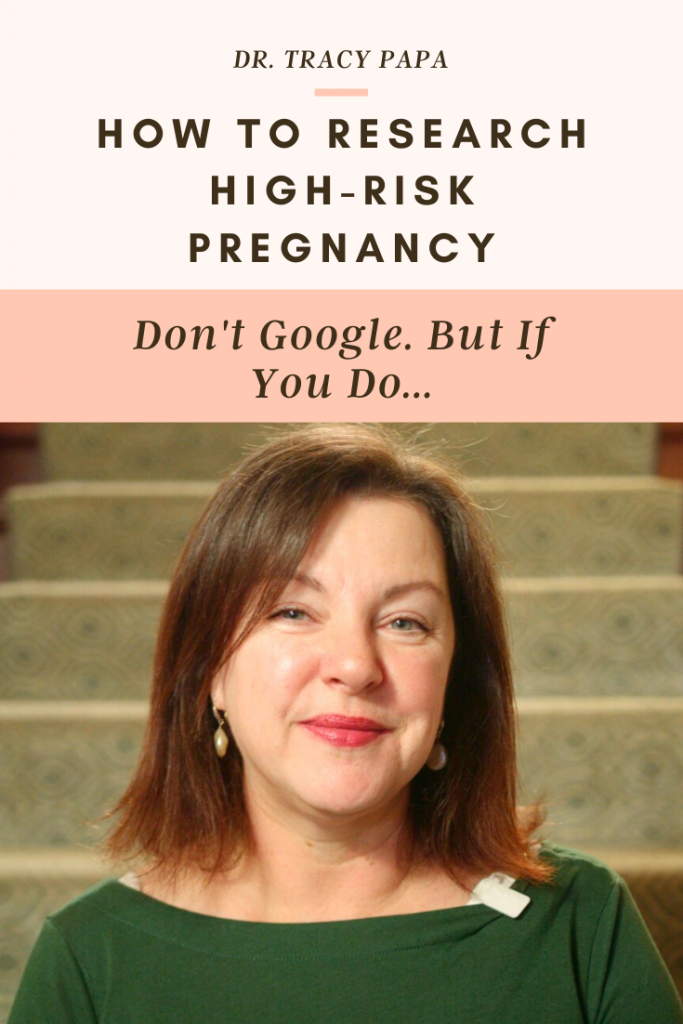Don't Google. But if You Do...| How To Research High-Risk Pregnancy
When you come to the Maternal Fetal Medicine office, and you have gestational diabetes or high blood pressure, or maybe your baby has an issue or a chromosome abnormality, you naturally want to know as much as possible as fast as possible.
One of the things I always tell people before they leave the office is, please don't go home and Google this.
And of course, I know that's precisely what you're going to do because that's what I would do. You want to know everything you can about what's going on with your pregnancy or your high blood pressure or your baby's heart abnormality. Maybe that's how you found my channel!
Hopefully, if your baby's been diagnosed with a condition, we've done an excellent job of trying to anticipate and answer all the questions that you have.
However, you're going to think of questions after you leave the office. Usually in the parking lot when you're processing our discussion, questions and "what ifs" will pop into your head. This when you're most likely to Google "ventricular septal defect", or "tetralogy of Fallot" or whatever it is that we have diagnosed you or your baby with.
Research is great and I love when my patients take a proactive approach to their health. However, with the amount of information on the internet, it's all too easy to encounter inaccurate, unnecessarily scary, or biased information that will lead you in the wrong direction.
How to Google smarter
Here are a few tips on how to Google smartly. And if you found my channel through YouTube or Google search you're already off to a great start!
The first thing you should consider is that if you have any assumptions about whether the outcome of your pregnancy is going to be good or bad, you're going to find information to support that assumption.
That's called confirmation bias. We all do this.
Sometimes that can be a really good thing because if you expect good things to happen, they is more likely to happen. For example, if you expect people are going to be nice, usually they are. That's been my experience at least. But if you expect that your baby is going to die, or you expect that the outcome of your pregnancy is going to be bad, you can find plenty of information on the internet to back up that assumption too.
Look at reputable websites first
One of the things that's key when you're searching a condition is to look at reputable websites.
Look for websites that end in ".edu" or ".org" because they are more likely to be reliable sources.
I like to recommend children's hospital websites, like Texas Children's, Children's Hospital of Philadelphia ,Cincinnati, San Francisco, Florida, etc...there are a whole lot of pediatric websites associated with universities that do a really good job.
If you go into a website like Texas Children's or Hermann Memorial, or any of the big fetal or pediatric centers, you're going to find information on what you want. These websites usually have their own search engine and if you plug in "twin-twin transfusion" or "ventricular septal defect," it will take you right to images of a baby's heart with diagrams and information on all the ways that things can go awry in development. Plus, they will outline treatments that they offer after delivery.
There are also really good websites that end in ".org," and most of these are support organizations. If your child, for instance, has Down syndrome or trisomy 18, any organization that ends in ".org" usually has a lot of information for parents and ways that you can engage with their community and get the information and support that you need.

Use personal blogs for support or inspiration, not medical advice
On the other hand, if you go to "joesblog.com", you're going to get opinions. Sometimes the information is good. Sometimes another mom's opinion or story is what you want to read or what you want to hear in that moment.
But remember that these people are parents and they're often not physicians themselves, or they don't have a medical background. How they have interpreted the information that they were given during their pregnancy is not necessarily the way a provider would explain it.
And it's not always correct. So if you're going to go to a ".com" website or someone's blog, just remember that they're telling their story, they're not necessarily giving you medical information.
Sometimes these things can be a really great resource and they can give you much-needed comfort. Especially hearing someone else's story when they've been through the same situation that you find yourself in right now.
I won't say they're not useful at all, but just remember that if you want medical information about what's happening with your baby's heart or spine or whatever, go to a medical website or the educational websites.
And if you want to know somebody's experience with having a baby with that condition, then a blog is fine. You may find a community for support.
You can always ask your doctor
Remember that you can always call your doctor back. If you have left my office or any MFM provider, and you think of questions, call us back and make another appointment!
We're happy to sit down with you and your family in a telehealth environment or a group setting to try to answer your questions and give you a better idea of what to expect.
So good luck with your research! And the best of luck with your pregnancy! If there are any questions that I can answer for you, please leave me a comment below!

